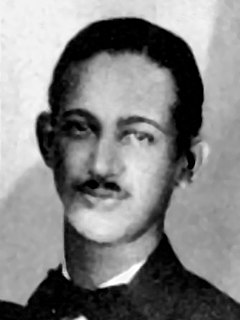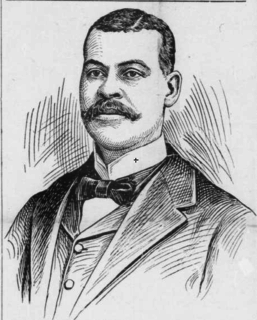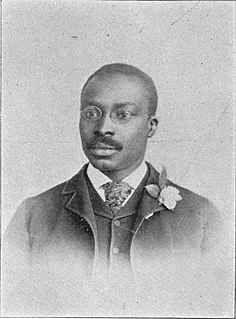Related Research Articles
The Methodist Episcopal Church, South was the Methodist denomination resulting from the 19th-century split over the issue of slavery in the Methodist Episcopal Church (MEC). Disagreement on this issue had been increasing in strength for decades between churches of the North and South; in 1844 it resulted in a schism at the General Conference of the MEC held in Louisville, Kentucky.

Henry Thacker ("Harry") Burleigh was an American classical composer, arranger, and professional singer known for his baritone voice. The first black composer who was instrumental in developing characteristically American music, Burleigh made black music available to classically trained artists both by introducing them to spirituals and by arranging spirituals in a more classical form. Burleigh also introduced Antonín Dvořák to Black American music, which influenced some of Dvořák's most famous compositions and led him to say that Black music would be the basis of an American classical music.

Robert Nathaniel Dett, often known as R. Nathaniel Dett and Nathaniel Dett, was a Canadian-American Black composer, organist, pianist, choral director, and music professor. Born and raised in Canada until the age of 11, he moved to the United States with his family and had most of his professional education and career there. During his lifetime he was a leading Black composer, known for his use of African-American folk songs and spirituals as the basis for choral and piano compositions in the 19th century Romantic style of Classical music.

Theophilus Gould Steward was an American author, educator, and clergyman. He was a U.S. Army chaplain and Buffalo Soldier of 25th U.S. Colored Infantry.

Miles College is a private historically black liberal arts college in Fairfield, Alabama. Founded in 1898, it is associated with the Christian Methodist Episcopal Church and a member of the United Negro College Fund.

Religion of black Americans refers to the religious and spiritual practices of African Americans. Historians generally agree that the religious life of black Americans "forms the foundation of their community life." Before 1775 there was scattered evidence of organized religion among black people in the Thirteen Colonies. The Methodist and Baptist churches became much more active in the 1780s. Their growth was quite rapid for the next 150 years, until their membership included the majority of black Americans.

Wilbur Patterson Thirkield was a Methodist bishop and educator born in Franklin, Ohio. He was the son of Eden Burrows Thirkield, a prominent merchant of that town. The Thirkield family had long been involved with the Methodist Church. James E. Thirkield, Wilbur's grandfather, had moved from Pennsylvania into the Miami River Valley in 1817. In 1825, James and his wife Jane signed the original charter for a Methodist Church in their new hometown of Franklin.

Ariel Serena Hedges Bowen was an African-American writer, temperance activist, and professor of music at Clark University in Atlanta in the late 19th and early 20th centuries. Twentieth Century Negro Literature (1902) noted that "she is regarded as one of the foremost and best cultured women of her race."

William Ward Pinkett, Jr. was an American jazz trumpeter and scat vocalist during the Harlem Renaissance. He played and recorded with King Oliver, Jimmy Johnson, Chick Webb, and Jelly Roll Morton.

John A. Lankford was the first professionally licensed African American architect in Virginia in 1922 and in the District of Columbia in 1924. He has been regarded as the "dean of black architecture".
The civil rights movement (1865–1896) aimed to eliminate racial discrimination against African Americans, improve their educational and employment opportunities, and establish their electoral power, just after the abolition of slavery in the United States. The period from 1865 to 1895 saw a tremendous change in the fortunes of the black community following the elimination of slavery in the South.

Ernest A. Lyon was an African-American minister, educator and diplomat.

The history of Methodism in the United States dates back to the mid-18th century with the ministries of early Methodist preachers such as Laurence Coughlan and Robert Strawbridge. Following the American Revolution most of the Anglican clergy who had been in America came back to England. John Wesley, the founder of Methodism, sent Thomas Coke to America where he and Francis Asbury founded the Methodist Episcopal Church, which was to later establish itself as the largest denomination in America during the 19th century.

Orishatukeh Faduma was an African-American Christian missionary and educator who was also an advocate for African culture. He contributed to laying the foundation for the future development of African studies.

Irvine Garland Penn was an educator, journalist, and lay leader in the Methodist Episcopal church in the United States. He was the author of The Afro-American Press and Its Editors, published in 1891, and a coauthor with Frederick Douglass, Ida B. Wells, and Ferdinand Lee Barnett of The Reason Why the Colored American Is Not in the World's Columbia Exposition in 1893. In the late 1890s, he became an officer in the Methodist Episcopal Church and played an important role advocating for the interests of African Americans in the church until his death.
Helena Maud Brown Cobb was an American educator and missionary from Georgia. Born in Monroe County, Georgia, she attended Atlanta University and served as an educator and principal at many schools for African Americans in the state. She was also active in organizing and pushing for greater missionary opportunities for women within the Colored Methodist Episcopal Church.
Central Alabama Institute was a school for African Americans in Alabama. It was established as Rust Normal Institute, a school to train African American teachers in Alabama in 1872. It opened in Huntsville, Alabama in 1878. It became Central Alabama Academy in 1890. In 1904 it moved to Mason City on the outskirts of Birmingham, Alabama. In 1922 its main building and other structures were struck by fire. It was not rebuilt or reopened. The school was affiliated with the Methodist Church.
Jay Samuel Stowell was an American author associated with the Methodist Episcopal Church. He died in St. Petersburg, Florida.
Gilbert Academy was a premier preparatory school for African American high school students in New Orleans, Louisiana.
References
- ↑ Stowell, Jay S. (1922). Methodist Adventures in Negro Education. The Methodist Book Concern. p. 129-33.
- ↑ "History". Saint Paul Methodist Episcopal Church. Retrieved 21 September 2019.
- ↑ Gilbert, Levi, ed. (November 18, 1914). "Annual Meeting Freedman's Aid Society". Western Christian Advocate. The Methodist Book Concern. 80 (46): 1302.
- ↑ "Negro Education: A Study of the Private and Higher Schools for Colored People in the United States". 1917.
- 1 2 Stowell 1922 , p. 132.
- ↑ "Piano Recital Monday Missionary Church". Daily Press . Newport News, Virginia. June 22, 1924. p. 20.
- ↑ Murphy, Larry G.; Melton, J. Gordon; Ward, Gary L., eds. (2013-11-20). "Haven Institute". Encyclopedia of African American Religions. Routledge. p. 331. ISBN 978-1-135-51338-2.
Coordinates: 32°22′11″N88°42′18″W / 32.369627°N 88.705044°W